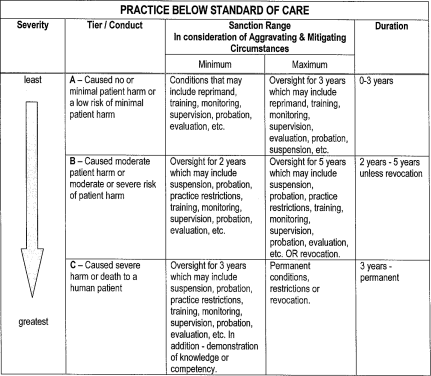
PROPOSED RULES
Original Notice.
Preproposal statement of inquiry was filed as WSR 08-14-076.
Title of Rule and Other Identifying Information: WAC 246-16-800 through 246-16-890, sanction schedule.
Hearing Location(s): Department of Health, Point Plaza East, Room 152, 310 Israel Road S.E., Tumwater, WA, on June 17, 2009, at 9:30 a.m.
Date of Intended Adoption: June 17, 2009.
Submit Written Comments to: Margaret Gilbert, Department of Health, Legal Services Office, P.O. Box 47873, Olympia, WA 98504-7873, web site http://www3.doh.wa.gov/policyreview/, fax (360) 236-4830, by June 17, 2009.
Assistance for Persons with Disabilities: Contact Margaret Gilbert by June 10, 2009, TTY (800) 833-6388 or 711.
Purpose of the Proposal and Its Anticipated Effects, Including Any Changes in Existing Rules: The proposed rules will satisfy the requirement of RCW 18.130.390 by establishing a consistent and enforceable sanction schedule applicable to all professions, for all disciplinary actions, both formal and informal. The rules will be used by each disciplining authority, including boards and commission and the secretary of health. The rules will establish sanction grids for six significant types of unprofessional conduct. The rules also contain instructions for using the grids as well as how to apply the rules when unprofessional conduct is not described in a grid. The rules include minimum periods of oversight and allow consideration of aggravating and mitigating circumstances as well as unique facts justifying deviation from the schedule.
Reasons Supporting Proposal: RCW 18.130.390 (section 12 of 4SHB 1103 passed in 2008) requires the secretary of health to adopt rules establishing a uniform sanction schedule for all disciplining authorities to follow when imposing sanctions on any license[d] health care provider for unprofessional conduct. This will protect the public health by promoting consistent outcomes of disciplinary cases.
Statutory Authority for Adoption: RCW 18.130.390.
Statute Being Implemented: RCW 18.130.390.
Rule is not necessitated by federal law, federal or state court decision.
Name of Proponent: Department of health, governmental.
Name of Agency Personnel Responsible for Drafting: Margaret Gilbert, Department of Health, P.O. Box 47873, Olympia, WA 98504-7873, (360) 236-4913; Implementation and Enforcement: Karen Jensen, Department of Health, P.O. Box 47850, Olympia, WA 98504-7850, (360) 236-4600.
No small business economic impact statement has been prepared under chapter 19.85 RCW. The proposed rule would not impose more than minor costs on businesses in an industry.
A cost-benefit analysis is not required under RCW 34.05.328. The agency did not complete a cost-benefit analysis under RCW 34.05.328. RCW 34.05.328 (5)(b)(ii) exempts rules that relate only to internal governmental operations that are not subject to violation by a nongovernment party.
May 5, 2009
Mary C. Selecky
Secretary
OTS-2076.4
SANCTIONS
NEW SECTION
WAC 246-16-800
Sanctions -- General provisions.
(1)
Applying these rules.
(a) The disciplining authorities listed in RCW 18.130.040(2) will apply these rules to determine sanctions imposed for unprofessional conduct by a license holder in any active, inactive, or expired status. The rules do not apply to applicants.
(b) The disciplining authorities will apply the rules in:
(i) Orders under RCW 18.130.110 or 18.130.160; and
(ii) Stipulations to informal disposition under RCW 18.130.172.
(c) Sanctions will begin on the effective date of the order.
(2) Selecting sanctions.
(a) The disciplining authority will select sanctions to protect the public and, if possible, rehabilitate the license holder.
(b) The disciplining authority may impose the full range of sanctions listed in RCW 18.130.160 for orders and RCW 18.130.172 for stipulations to informal dispositions.
(i) Suspension or revocation will be imposed when the license holder cannot practice with reasonable skill or safety.
(ii) Permanent revocation may be imposed when the disciplining authority finds the license holder can never be rehabilitated or can never regain ability to practice safely.
(iii) Surrender of credential may be imposed when the license holder is at the end of his or her effective practice and surrender alone is enough to protect the public. The license holder must agree to retire and not resume practice.
(iv) Indefinite suspension may be imposed in default and waiver of hearing orders. If indefinite suspension is not imposed in a default or waiver of hearing order, the disciplining authority shall impose sanctions determined according to these rules.
(v) "Oversight" means a period of time during which respondent must engage in on-going affirmative conduct intended to encourage rehabilitation and ensure public safety. It also includes active compliance monitoring by the disciplining authority. The passage of time without additional complaints or violations, with or without payment of a fine or costs, is not, by itself, oversight.
(c) The disciplining authority may deviate from the sanction schedules in these rules if the schedule does not adequately address the facts in a case. The disciplining authority will acknowledge the deviation and state its reasons for deviating from the sanction schedules in the order or stipulation to informal disposition.
(d) If the unprofessional conduct is not described in a schedule, the disciplining authority will use its judgment to determine appropriate sanctions. The disciplining authority will state in the order or stipulation to informal disposition that no sanction schedule applies.
(3) Using sanction schedules.
(a) Step 1: The findings of fact in an order or the allegations in an informal disposition describe the unprofessional conduct. The disciplining authority uses the unprofessional conduct described to select the appropriate sanction schedule contained in WAC 246-16-810 through 246-16-860.
(i) If the act of unprofessional conduct falls in more than one sanction schedule, the greater sanction is imposed.
(ii) If different acts of unprofessional conduct fall in the same sanction schedule, the highest sanction is imposed and the other acts of unprofessional conduct are considered aggravating factors.
(b) Step 2: The disciplining authority identifies the severity of the unprofessional conduct and identifies a tier using the sanction schedule tier descriptions.
(c) Step 3: The disciplining authority identifies aggravating or mitigating factors using the list in WAC 246-16-890. The disciplining authority describes the factors in the order or stipulation to informal disposition.
(d) Step 4: The disciplining authority selects sanctions within the identified tier. The starting point for duration of the sanctions is the middle of the tier range.
(i) Aggravating factors move the appropriate sanctions towards the maximum end of the tier range.
(ii) Mitigating factors move the appropriate sanctions towards the minimum end of the tier range.
(iii) Mitigating or aggravating factors may result in determination of a sanction outside the range in the tier. The disciplining authority will state its reasons for deviating from the tier range in the sanction schedule in the order or stipulation to informal disposition. The disciplining authority has complied with these rules if it acknowledges the deviation and states its reasons for deviating from the sanction schedules in the order or stipulation to informal disposition.
[]
 |
[]
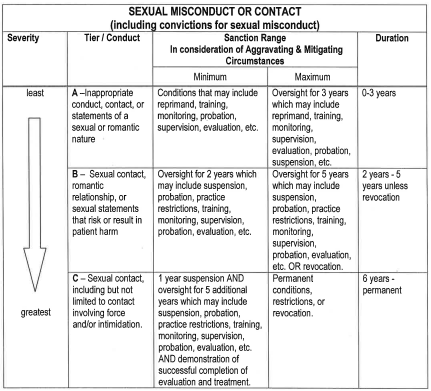 |
[]
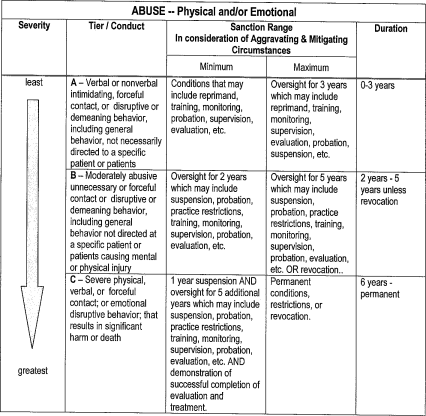 |
[]
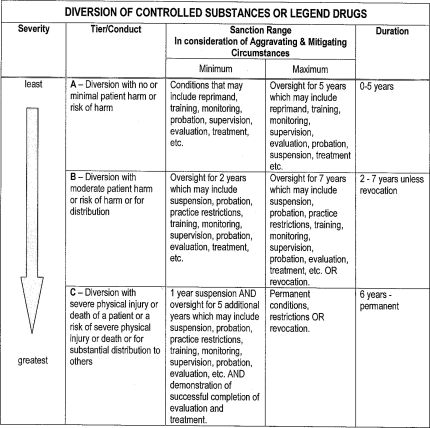 |
[]
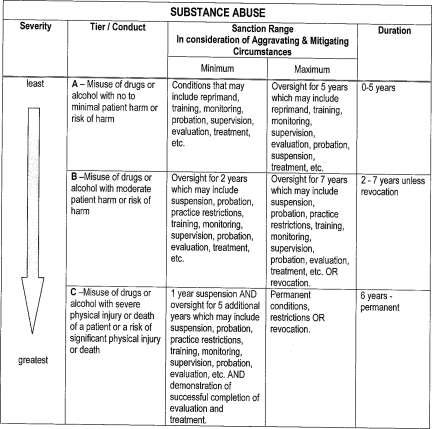 |
[]
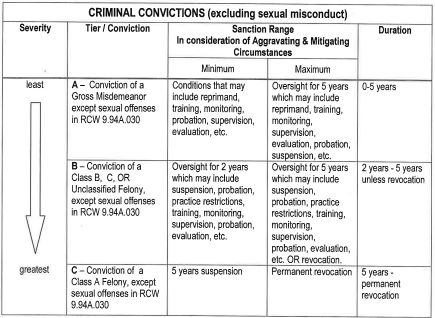 |
[]
(1) Factors related to the unprofessional conduct:
(a) Gravity of the unprofessional conduct;
(b) Age, capacity and/or vulnerability of the patient, client or victim;
(c) Number or frequency of the acts of unprofessional conduct;
(d) Injury caused by the unprofessional conduct;
(e) Potential for injury to be caused by the unprofessional conduct;
(f) Degree of responsibility for the outcome;
(g) Abuse of trust;
(h) Intentional or inadvertent act(s);
(i) Motivation is criminal, immoral, dishonest or for personal gain;
(j) Length of time since the unprofessional conduct occurred.
(2) Factors related to the license holder:
(a) Experience in practice;
(b) Past disciplinary record;
(c) Previous character;
(d) Mental and/or physical health;
(e) Personal circumstances;
(f) Personal problems having a nexus with the unprofessional conduct.
(3) Factors related to the disciplinary process:
(a) Admission of key facts;
(b) Full and free disclosure to the disciplining authority;
(c) Voluntary restitution or other remedial action;
(d) Bad faith obstruction of the investigation or discipline process or proceedings;
(e) False evidence, statements or deceptive practices during the investigation or discipline process or proceedings;
(f) Remorse or awareness that the conduct was wrong;
(g) Impact on the patient, client, or victim.
(4) General factors:
(a) License holder's knowledge, intent, and degree of responsibility;
(b) Presence or pattern of other violations;
(c) Present moral fitness of the license holder;
(d) Potential for successful rehabilitation;
(e) Present competence to practice;
(f) Dishonest or selfish motives;
(g) Illegal conduct;
(h) Heinousness of the unprofessional conduct;
(i) Ill repute upon the profession;
(j) Isolated incident unlikely to reoccur.
[]